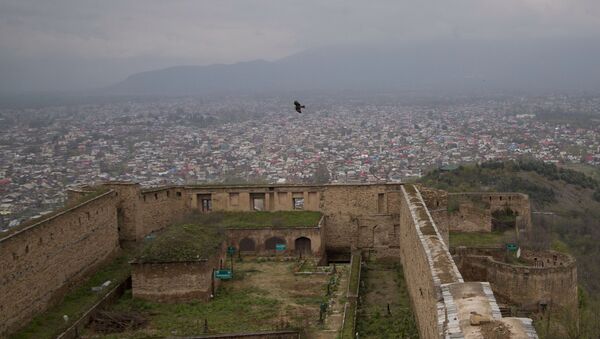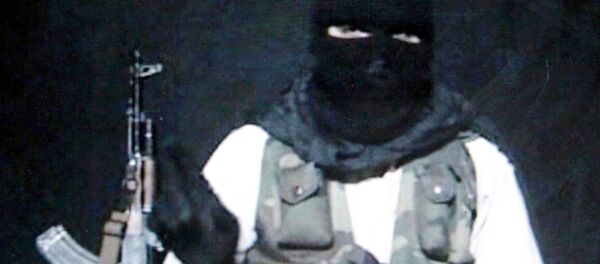Riyaz Naikoo, a math teacher in a local school, took up arms in 2012 after joining Hizbul Mujahideen, a Kashmiri militant group founded in 1989 seeking the independence of Kashmir from India. Naikoo, like the group’s popular leader Burhan Wani who was killed in 2016, also held sway with locals in the Valley.
Beighpora encounter in which top Hizbul Mujahideen commander, Riyaz Naikoo along with his associate were killed. pic.twitter.com/OOE5SdYZTy
— Waseem Andrabi (@waseem_andrabi) May 6, 2020
After the death of Wani, the group was considered wiped-out. Now Jammu and Kashmir Police have also described the killing of Naikoo as "breaking the back of the Hizbul Mujahideen in south Kashmir".
Soon after the encounter began in the Sharshali Khrew area of Kahsmir’s Awantipora, the authorities snapped the internet connection in the region again. However, videos and reports of incidents of stone throwing had already started pouring in from the Valley over Naikoo’s killing.
Massive violence around the encounter site in #South #Kashmir’s #Pulwama. pic.twitter.com/olYLIsjRLh
— Sohil Sehran (@SohilSehran) May 6, 2020
Kashmir witnessed unprecedented violence by civilians after security forces killed Burhan Wani on 11 July 2016. Hundreds of people lost their lives and thousands of Kashmiris reportedly suffered pellet injuries after being fired upon by security forces during the violence and stone-pelting over several months in 2016.
Senior Fellow at the Observer Research Foundation and security analyst Sushant Sareen believes the possibility that Kashmir will see similar protests and violence in the aftermath of Naikoo’s death cannot be completely ruled out.
“While there could be a couple of demonstrations, things might not deteriorate beyond a point. I think that would be the expectation at this time", Sareen tells Sputnik.
Considering such factors as the lockdown already in place due to COVID-19 and the increased presence of security personnel since August 2019, Sareen says: “I think there is a sense that perhaps the security forces are much better prepared now and are not going to get blind-sided. After the death of Burhan Wani in 2016, the kind of reaction that came from the streets was not anticipated. I think this time around the reaction would have been taken into account”.
Emergence of New Group
April 2020 has also seen the rise of The Resistance Front (TRF), a new militant outfit in the Valley. TRF claimed responsibility for the killing of five army personnel along the Line of Control on 5 April, following which India and Pakistan have been exchanging cross-border fire relentlessly. The first time the outfit claimed responsibility was October 2019 when they hurled a grenade in Srinagar.
NEW : Viral Picture 📷
— SOPORE UPDATES ¹💿 (@SoporeNews1) May 4, 2020
Pro TRF (The Resistance Front) and pro Taliban graffiti seen in #Kashmir. Location Unknown#Kupwara #Pulwama #Shopian #Srinagar pic.twitter.com/yzSbdLW90L
While there are claims in the Indian media that the new group is a cover-up of Lashkar-e-Taiba and Jaish-e-Mohammed by Pakistan to escape the FATF, Sareen says that these new groups formed with secular sounding names are to escape the wrath that comes from Islamic sounding names.
While Hizbul Mujahideen comprises local youths, the TRF is being termed as an extension of Pakistan-based terror groups. Commenting on whether the new outfit enjoys local support or not, Sareen says: “No terrorism can survive if there is no local support. There is always a reservoir of local support. There has always been a reservoir of local support. The question is how much local support”.
He says: “There was a time when there was so much local support that there absolutely was no information. But now if you get information, then there is no overwhelming support. There are always people who resent them but because of the fear of the gun, because of the fear of being labeled a traitor, they go along with them”.
Impact of Article 370
The Indian government stripped Jammu and Kashmir of its special status with the revocation of Article 370 on 5 August 2019. The state was also turned into a federally-administered territory, i.e. the disputed territory is under the direct control of the Narendra Modi government. In order to curb any protests and backlash from the people, the region was placed under a complete lockdown and communications blockade with the snapping of mobile and internet connection.
But with the rise in terror activities since April and questions about whether the absence of Article 370 will help the government control the situation in the Valley, Sareen doesn’t expect any major transformation just yet.
“Article 370 is not a quick fix solution for terrorism. We also need to look at the larger perspective of changing the things that have been happening in Jammu and Kashmir for the past 70 years. We will see how it will play out over a few years", he says.
Addressing the situation, Sareen says: “I don’t think the assembly line of terrorists is ending any time soon. The larger dynamic is not going to change much”.







